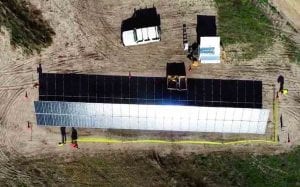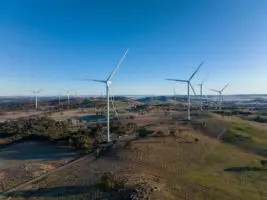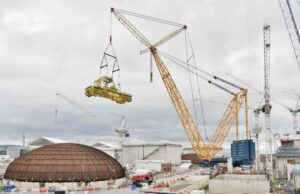Gas connections in new homes and government businesses will be banned in Victoria starting from the first day of 2024, in a decisive move by the Labor Andrews government to wean the state’s housing stock off fossil fuels.
Victorian energy minister Lily D’Ambrosio said on Friday that from January 01 2024, planning permits for new homes and residential subdivisions will only connect to all electric networks, marking a major about face for the state with the highest residential gas use in Australia.
To support the move, a new $10 million Residential Electrification Grants program has been launched, offering volume home builders, developers and others to provide bulk rebates for solar panels, solar hot water and heat pumps to new home buyers up front.
The state government will also invest $1 million in targeted training for the construction industry, to add to Solar Victoria’s $11 million training program to upskill plumbers and electricians for the delivery of energy efficient, all-electric homes.
“We know that with every bill that arrives, gas is only going to get more expensive. That’s why we’re stepping in to help even more Victorians get the best deal on their energy bills,” said D’Ambrosio in a statement.
“Reducing our reliance on gas is critical to meeting our ambitious emission reduction target of net zero by 2045 and getting more Victorians on more efficient electric appliances which will save them money on their bills.”
- Read more about home and business electrification on RenewEconomy sister sites One Step Off The Grid and SwitchedOn
Victoria follows ACT lead
The move means Victoria will become the second state in Australia to introduce a ban on new gas connections, following closely on the the ACT, whose landmark law prohibiting the use of fossil gas in new homes and businesses is set to come into play in the nation’s capital as early as November.
The ACT government’s Climate Change and Greenhouse Gas Reduction (Natural Gas Transition) Amendment Bill was passed through the Legislative Assembly last month to establish the legal framework to end new gas network connections. Labor and the Greens hold a majority in the ACT assembly.
Victoria had been under increasing pressure to follow suit, with the fossil fuel industry ramping up efforts to induce consumers to switch from electric appliances to gas, and in light of increasing evidence that making homes all-electric is a no-brainer for governments trying to cut emissions and cost of living.
An economic no-brainer
Just last week, a new Environment Victoria report found that households in the state could save hundreds of dollars – or up to 75% – on their winter heating bills by switching from gas to efficient electric appliances.
The report, based on modelling by Renew, shows that an average home in Melbourne’s south-east using gas for heating over the winter months of June, July and August can expect to pay a total of around $716 to keep warm.
The cost of heating the same space using efficient, electric reverse cycle heating slashes that to just $169 – a massive 75 per cent reduction.
“We congratulate the Andrews government for taking this vital step that will help Victoria achieve its climate targets and kick our expensive gas addiction,” said Environment Victoria CEO Jono La Nauze on Friday.
“Gas is an expensive and polluting fossil fuel. The long term trend is that gas prices will keep rising whilst renewable electricity gets cheaper. It simply makes no sense to keep connecting new homes to the energy source of the past.”
Much more work to be done
But while the new connections ban – and the message it delivers to the gas industry – is welcome, it does little to address the problem of the 2 million Victorian homes already connected to gas and how to transition them to all-electric.
“Much more work remains to be done,” says La Nauze. “We look forward to the Andrews government updating its Gas Substitution Roadmap later this year, which must include a clear plan for helping … homes already connected to gas to be retrofitted with efficient electric appliances.”
The state’s Solar Homes scheme goes a small way to address this issue, offering rebates of up to $1,000 on the cost of installing electric hot water systems and for switching out gas heating for reverse cycle air-conditioning units.
In the meantime, a ban on new residential gas connections is a strong move in the right direction.
A “clear and sensible plan”
“Victoria has the most to gain from electrification, because it has the most households relying on gas and exposed to price gouging by international gas companies,” said Rewiring Australia’s Saul Griffith, a long-time campaigner for all-electric homes.
“The state government has a clear and sensible plan to lower household bills and decrease reliance on fossil fuels. This is the type of commonsense leadership Australia needs,” Griffith said on Friday.
“Going all-electric means healthier homes, lower bills and a big step towards a net zero community,” said Energy Efficiency Council CEO Luke Menzel in response to the news.
“With interest rates sky high, if used to help pay off your home loan, [the] bill savings from going all-electric could slash two years off an average 25-year mortgage in Melbourne.
“Given the upfront costs of building an all electric home are comparable to building a home with a gas connection, that makes going all-electric a no brainer.”
The Royal Australian College of General Practitioners have also welcomed the gas ban, saying the announcement shows the government is taking practical steps to protect Victorians’ health.
“Gas stoves expose people to respiratory irritants, which leads to a multitude of respiratory conditions, and research indicates this includes triggering asthma in children,” said RACGP co-deputy chair Dr Aadhil Aziz.
“As the old saying goes, ‘An ounce of prevention is worth a pound of cure’ – and that’s true in both health and climate. This announcement shows the government is serious about addressing both climate change and health, and is listening to medical professionals.”
Fossil fight back?
How will the gas industry respond? As Rewiring Australia’s Dan Cass said on Friday, there’s bound to be strong push-back against what is, essentially, “a profound act of climate leadership.”
“The fossil fuel industry will bleat about this decision because they want to keep gouging households and they do not care about the planet,” Cass said.
“When someone shifts from grid power dominated by coal to rooftop solar, or from a petrol to electric car, they do more than change an energy source. They permanently lower their emissions and energy bills, and they never look back.”










